
The eagle has been part of the Wheat identity since the company’s beginning.
In 1977 the world was much different than it is today. It is the year of the infamous New York City Blackout which lasted 25 hours. It was also the year that Elvis died, Jimmy Carter was elected President of the United States, the Alaskan Pipeline was completed, and NASA launched its first test flight of the Space Shuttle.
And in the city of Gaithersburg, MD people were lining up to see the very first Star Wars movie hit the big screen and Jim Wheat was opening the doors to his new venture, a plumbing company that would eventually become a powerhouse in the local HVAC world.
In the beginning, the company was a one-man shop with Jim Wheat doing all the physical work and his wife working part-time helping with the books. The company was small but nimble and Jim focused on treating customers like family. He built a reputation for quality service.
In those early days, this plumbing business was all in the new construction sector with some work in residential service and remodeling. Then, in the mid-198os, when new construction began its decline, so Wheat dropped it to focus on residential service and remodeling.
Heating and Air Conditioning Work
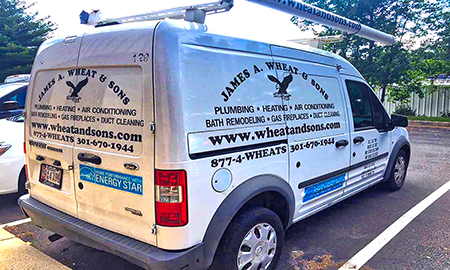
Jeff Wheat says, ‘There is nothing like seeing one of our well-equipped vehicles coming down the street.’
Early into the 1980s, Wheat began dabbling in the heating and air conditioning business. That was due to a good friend who worked for the government and needed help with installations and permit pulling. So, gas-fired heating and air conditioning became a small part of what Wheat’s company did.
According to Jeff Wheat, his father went to Syracuse, NY and took classes from Carrier Corp. Those initial classes lead to a culture of learning and training that persists today.
Today James A. Wheat & Sons is in the plumbing, heating, and air conditioning business. They do approximately $1.75 million in plumbing and $3.25 million in HVAC ‘ all in the residential service and remodel marketplace.
More Family in the Family Business
His oldest son, Michael, grew up in the business, graduated high school, and opted to go to college. He earned a degree in business, and after graduation, joined his father’s company managing the office.
Jeff Wheat also spent many of his early years helping out at the company. He jokingly says he started working when he was six-years-old. When he finished high school, he opted out of college and became part of his father’s full-time team working in the field and earning certifications in the technical aspects of installing, repairing, and replacing plumbing and HVAC systems.
‘In between all that, I also attended a trade school,’ he says. ‘But that was just one day a week. In 1992 I was in a truck and have been working fulltime managing the technical side of the business ever since.’
According to Jeff Wheat, he and his brother bought out their parents in 2008. That was the year that China hosted their very first Olympic games and Michael Phelps won a record-breaking eight gold medals. It was the year the world’s economy nose-dived in what was dubbed the worst financial crises since the Great Depression.
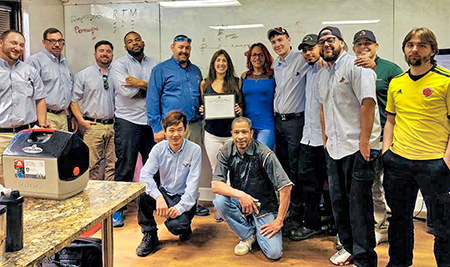
Jeff Wheat and his technical team celebrate with Comfort Consultant Manager Sara Morris, who was named the Company Employee of the Month for May 2018.
It was a time of hunkering down and taking care of business. Jeff ran all the jobs, made sure that the service and installation technicians did the work properly, and helped them do that by providing the right tools, instruments, and trucks.
Michael ran the business. Jeff says, ‘If it wasn’t for my brother, we’d own every tool and toy in the world. And we would be broke. So, it is a pretty good balance.’
That is not to say that Michael isn’t technical. Jeff says they both worked in the field and Michael understands what needs to be done in that area as well. But his focus is on managing the business and Jeff handles all the technical aspects of the company.
The NCI Connection
The onslaught of the 2008 recession didn’t stop the brothers from a mission of growth and continuing education. Jeff says it was in the late 1990s, early 2000s that he attended his very first National Comfort Institute certification class.
‘My mother and brother had attended NCI classes prior to that, but after I took my first air balancing class, I came home and asked why we weren’t looking at the ductwork??
He says that prior to taking that class, all duct work was subbed out.
‘After that class, I realized that doing duct work was not that hard. A light bulb went off and we began doing load calculations and Manual D-sizing so we could do our own ductwork. And we do it to NCI standards.
‘This firmed it up in my head how important training is. It led to a mentality where I’d rather hire a young, inexperienced person with a great attitude to work in the field. Then I can train that person on all the technical stuff. I am very big on that,’ Wheat says.
Training is Key
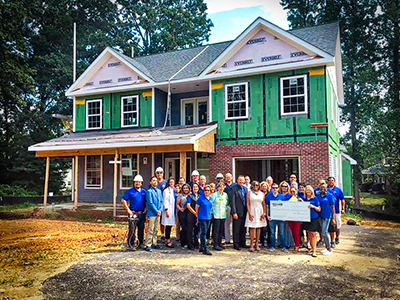
James A. Wheat & Sons partnered with Thomas Edison High School in 2017 to help educate future HVAC technicians.
Today James A. Wheat & Sons is very big on the training front. As a Carrier Factory Authorized Dealer, he has access to great training opportunities for the mechanical equipment his company sells and installs. Many of his technicians carry NATE certifications as well as NCI certifications. The goal is to deliver installations and service well beyond code and customer expectations.
‘To get there, I also do a lot of training with my tech people myself. I get in the truck and I go out with them.’
In addition to managing the technical side of the business, Jeff is also the lead technician who is on call for whenever his field team runs into difficulties. He explains that he is the first person they call when there is a situation they cannot figure out. He’ll try to talk them through it, but if that doesn’t work, he goes to the job site to help. He says he makes these callbacks teaching moments for the technicians.
‘I want them to learn what they missed or how I came up with the solution. It’s all on-the-job training.
‘I am trying to get a stronger training program going where I do a class once a week on a topic. I haven’t been able to get that off the ground because of time restraints, but that is something I’m shooting for,’ Jeff Wheat adds.
On the Performance Path
Over the years Wheat and Sons has developed a reputation in the markets they serve for taking a static pressure reading on every job. Ever since taking the NCI training and earning certifications in residential air balancing and combustion performance/CO safety, Jeff requires his team ‘plot airflows, take temperature measurements at the equipment and registers, and check for carbon monoxide on every single job.’
He adds that his salespeople also conduct those tests and measurements.
‘Their conversations with customers always revolve around comfort: what areas of the house are too hot, too cold, and so on,’ he says. ‘They explain that no house is supposed to have different temperatures through each level. The design is not supposed to be like that. And we can fix that.
‘We got into home performance pretty heavily. Our team not only looks at making sure each room has the right number of grills and registers, but also we’re concerned about losing air into the attic space and that air coming into the house.’ We talk a lot about humidity. It is amazing to me how many of our competitors don’t talk about humidity. But here on the eastern shore, humidity is really what we need to control to make people comfortable.’
This is stuff that most HVAC contractors don’t talk to customers about. Many say they don’t because of pushback by customers who don’t understand why the cost is so high and other contractors don’t even mention this stuff.
But the team at Wheat & Sons has been doing so for years.
‘Our customers mostly don’t push back,’ he explains. ‘They do ask why nobody else tell them about this kind of stuff. We explain it by telling our story. We also didn’t look at it for a long time. Only after we learned how important it was and what it can do to the efficiency of the equipment. That is when we decided to learn more, get trained, and start addressing this. We find when we explain it this way we set ourselves apart from everybody else.’
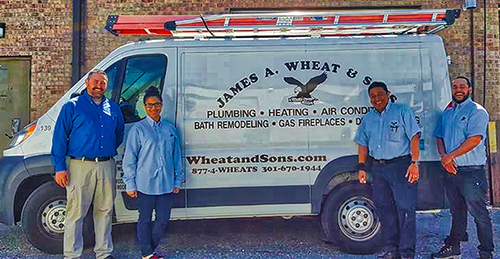
Performance-Based Contracting company James A. Wheat and Sons actively seeks and tries to recruit young people. This images is from an online promotion on careers in the HVAC industry.
Still Navigating the Path
‘Are we a full Performance-Based Contracting’ company the way NCI teaches it? Not yet. We have a long way to go,’ Wheat says. ‘The process doesn’t come through every time. We talk about it in-house more than we used to. Our good competitors, who share the same markets with us, often tell me they wish they could get their field teams to take static pressure and other diagnostic measurements the way we do. That is a big step for us. We are working on following the process on every sale, but we aren’t there yet. One step at a time.’
But Jeff is very positive about the ramifications of Performance-Based Contracting on his business. He says the training and certifications from NCI have benefitted his customers as well as his business, practically from the very first training class he attended. Especially when it comes to CO.
‘I would never feel comfortable checking a gas appliance without a CO analyzer nowadays,’ he explains. ‘I don’t know how guys are out here doing it without them. To this day, there are only two or three other HVAC companies in our area that have CO analyzers on every truck. It is really disturbing.
Even his plumbers carry the analyzers. He says that really takes the plumbing business to a different level.
‘My plumbers check CO on every job too. There is no other plumber around here that is doing anything like that.
‘The bottom line, our affiliation with NCI has set us apart from our competitors and made us a much better company.’
Message to the Industry
Jeff Wheat says that doing things right the first time isn’t easy. He says it takes commitment, enthusiasm, training, and having the right attitude to be successful.
‘It is a great industry when you learn the basics, understanding it, and apply it. The skills we have can be applied anywhere in the world. We need to explain this to young people and get them excited about joining this industry.
‘We need them to understand they will always have a job, even if they decide to leave the U.S. They can work doing HVAC anywhere in the world. Everybody has to deal with temperatures and comfort in homes and buildings. It is a no-brainer.
‘And you can make a great living at it.’ But the key is education. Not only from trade schools, but through training, by reading HVAC equipment manuals, trade magazines, joining forces with organizations like NCI. It will make you a much better technician, manager, and contractor.


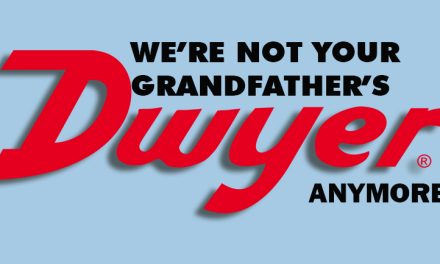


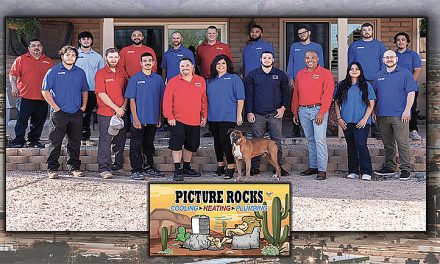
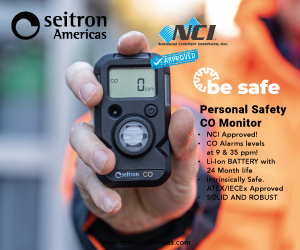





This is an interesting story. Having a business for more than 4 decades is really something else. They have done a great job to stand still in a competitive industry. I wish JAMES A. WHEAT & SONS more success and continue your kind of service.